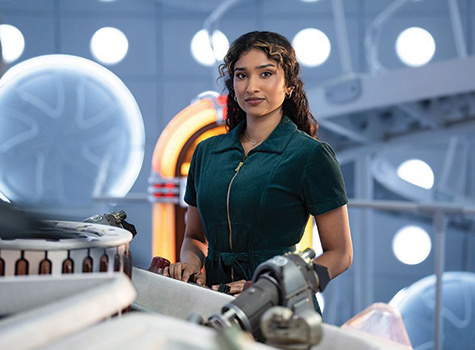By Jennifer Allen
“Instinct can be fought. We’re human beings with the blood of a million savage years on our hands, but we can stop it. We can admit that we’re killers, but we’re not going to kill today. That’s all it takes. Knowing that we’re not going to kill… today.”
~ Captain James T Kirk, excerpt from A Taste of Armageddon

Take a moment to remember a time back when we were all a bit younger. A time when we would curl up in front of the television or sit back in your movie seat… and prepare to be amazed by yet another adventure given to us by the crew of the starships, Enterprise, Voyager or aboard the space station, Deep Space Nine. Each week we would partake in a new tale and ride along with each of our favorite and iconic characters and maybe, just maybe, see a new facet of human nature in the process.
In 50 years’ time, Star Trek has delved into subject matters that many others wouldn’t dare to touch. Love, war and everything in-between has been explored in this iconic television series. While some may write the show off as simply “a fad”, I can honestly say that Star Trek in all of its forms has given us reason to hope for a better future.
September 8, 1966 was an evening that changed the world forever as audiences were first introduced to the crew of the Enterprise with the Star Trek episode, The Man Trap. Even though the show lasted only three seasons during its original run, syndication made it possible for future generations to also enjoy the crew’s continuing mission to explore new worlds and new civilizations.
I was born after the initial run, but almost every evening in my youth, my mother would put Star Trek on the TV so we could watch. To me, this was a show so different than all the cartoons I would watch after I got home from school. My youthful eyes also never once saw the show as archaic or weird. It was just cool science fiction that also had some of the most amazing storylines you just didn’t see anywhere else at the time.
Fast forward to September 28, 1987 when once again we sat down and joined a new crew of the Enterprise with the next generation of Star Trek in the episode Encounter at Farpoint. My 13 year-old self was so elated by the fact that now I had my own version of Star Trek to grow up with. Indeed I grew up with Jean Luc Picard and crew, and then eventually joined by both Captains Benjamin Sisko and Kathryn Janeway on all their adventures as well.
“Buried deep within you, beneath all the years of pain and anger, there is something that has never been nurtured: the potential to make yourself a better man. And that is what it is to be human. To make yourself more than you are.”
~ Captain Jean Luc Picard, excerpt from Star Trek: Nemesis
Among all the glamour that Star Trek has provided over the decades, the base of it all has been stories that analyze what makes human beings tick. It gave us a crew who explored new civilizations but who also would find species that are not all that different from ourselves at different points of human history. One subject that frequently came up throughout the years was that of racism. Even though the Federation had (seemingly) grown past such a concept, it still managed to appear in various ways.
One prime example of this is an episode from the original Star Trek entitled, Let That be Your Last Battlefield. This pinnacle story showed two beings named Lokai & Bele. They appear identical except for one small detail: they have different colorations on their faces. One has black on the right while the other has black on the left. That tiniest of differences makes them mortal enemies, something that the Enterprise crew finds bewildering. By the end of the episode, it turns out that Lokai & Bele are the last of their kind, who then are beamed down to a world completely destroyed by global war… and also to deal their own mutual hatred.
The second is the story of the 6th Star Trek film, The Undiscovered Country. Initially this film’s message was (like Star Trek: the Voyage Home) one of environmental preservation. However, the bigger message was that of conquering years of prejudice and seeing those chosen people in a new light. Despite Kirk saying for years and years that we must fight our instinct to hate and destroy, he himself becomes this with his own animosity towards the Klingon people. Eventually he realizes that “people can be very frightened of change” and tries to set things right.
Even heroes like James T. Kirk are not perfect, but that is also part of what makes us human beings. We all start with preconceived notions due to our own cultures and experiences. Learning how to accept that as part of our past will help us move forward to the future and therefore create a better world for ourselves.
Truthfully, if more people could experience Star Trek in it’s entirety, we would have less grief and torment in the world. Less hatred towards those who are “different” and more tolerance to accept any and all races, lifestyles and religions. We simply become better people and more like those officers who travel the galaxies searching where no one has gone before.
If you haven’t seen Star Trek, you can find most of the series right now either in syndication on various television stations or find each series and film in their entirety on Netflix. Not every episode is perfect, but neither are we. As a whole, however, I feel you will learn more about yourself, each other, and society as a whole after a good handful of episodes.
And as always… Live Long and Prosper.
The epic story continues on July 22 with release of Star Trek: Beyond. Sadly we recently lost one of its many talented co-stars, Anton Yelchin who played the new Pavel Chekov. He will always be remembered as so many other beloved Star Trek actors we’ve lost over the years…



